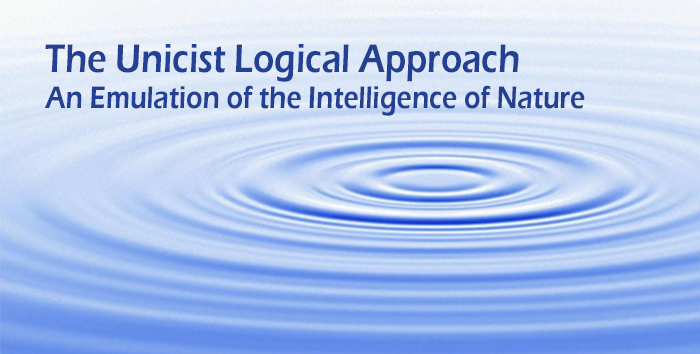The Unicist Research Institute
Pioneers in Complexity Science Research since 1976




Main Discoveries in Basic Sciences & Life Sciences
The discovery of the Ontogenetic Intelligence of Nature gave birth to the unicist approach to complexity and was the beginning of the development of the Unicist Theory which included a theoretical framework to deal with complex adaptive systems. The Unicist Theory was completed integrating the unicist ontology, the unicist logic, the unicist ontology of evolution and unicist objects to research, design and develop complex adaptive systems.

The Scientific Collaboration Space has been designed to give access to the unicist paradigm shift in sciences made by the Unicist Theory and to the upgrades this change produced in different application fields.
Basic Research
- Unicist Ontogenetic Intelligence of Nature
- Unicist Logic: The Double Dialectical Logic
- Unicist Anthropology
- Unicist Ontology to deal with adaptive systems
- The Ontogenetic Structure of Concepts
- Analogy between the Nature of Concepts and the DNA
- Unicist Mechanics & Quantum Mechanics
- Unicist Ontology of Evolution
- Unicist Ontology of Human Intelligence
- The Ontogenetic Maps
- Homology between the unicist ontological structure, the atomic structure, biology and electricity
- The Unicist Complexity Science Research to deal with Adaptive Systems
- The Nature of Semiosis
- What are Complexity Sciences
- Discovery of the Behavior of Objects in Complex Adaptive Systems
- Development of the Mathematical Foundations of Reality Indicators
- Discovery of the Structure of the Emulation of Reality
- Synthesis of Conceptual Psychology
- Functionality of Dualistic Logic in Complex Environments
- Discovery of the Structure of Aprioristic Fallacies
- Discovery of the Unicist Ontology of Complementation
Life Science Research
- Development of the Scientific Foundations of Medicine
- The Unicist Ontology of Health
- The Unified Field of Healthcare
- The Unicist Ontology of Amino Acids
- Homology between Concepts and Stem Cells
- The Ontogenetic Intelligence of Nature
- Unicist Destructive Tests in Biology
- Unicist Non-destructive Tests in Biology
- The Fallacy of Organs and Chronic Diseases
- The Unicist Structure of Viruses
- The Ontogenetic Map of Chronic Diseases
- The Ontogenetic Map of Addictions
- The Ontogenetic Map of Stress
- The Ontogenetic Map of Cure
- The Ontogenetic Map of Immune Systems
- The Ontogenetic Map of Therapeutics
- The Ontogenetic Map of Diseases
- The Ontogenetic Map of Medical Specialties
- Unicist Universal Diagnoses
- The Ontogenetic Map of Patients
- Conceptual Psychology
- The Roots of Human Intelligence
- The Universal Structure of Evolution and Involution
- The Ontogenetic Map of Complex Adaptive Systems
- The Ontogenetic Map of Clinical Trials
- The Ontogenetic Map of Research & Researchers
- The Ontogenetic Map of Healthcare Organizations
- The Ontogenetic Map of Prevention
- Unicist Universal Quality Assurance
- Unicist Universal Decision Making
Scientific applications of the Unicist Theory that changed paradigms of existing Sciences:
In Scientific Research - 1980: Development of a unicist ontological methodology for complex systems research, substituting the systemic approach to research adaptive systems. 2014: The integration of the unified field of macro and micro behavior. 2015: Development of the destructive and non-destructive tests to research adaptive environments.
In Life Sciences - 1988: Discovery of the functional structure that regulates evolution and the unicist ontological structure of living beings as a unified field. 2006: Discovery of the unicist ontological algorithm of evolution and involution. 2008: Discovery of the two types of integration, complementation and supplementation, of elements in complex adaptive systems. 2012: Discovery of the unicist ontology of biological entities. 2013: Confirmation of the unicist ontology of viruses. 2014: Discovery of the ontological structure of chronic diseases. 2014: Discovery of the structure of therapeutics. 2015: Discovery of the ontological structure of health. 2016: Development of the Scientific Foundations of Medicine.
In Complexity Sciences – 1998: Development of the unicist ontology emulating the ontogenetic intelligence of nature. 2003: Discovery of the anti-concepts that work as antimatter. 2006: Development of objects to manage human adaptive systems emulating the structure of nature. 2011: Discovery of the unicist ontology of complex adaptive systems. 2014: Discovery of the behavior of objects in complex adaptive systems. 2015: Discovery of the essential opposition but operational complementation between the active function and the energy conservation function of concepts. 2017: Discovery of the unicist ontology that integrates the wide and restricted contexts.
In Information Sciences – 2002: Development of unicist ontogenetic based ontologies replacing the empirically structured ontologies. 2014: Development of unicist adaptive robotics. 2015: Development of prototypers. 2016: Discovery of the nature of conceptual design.
In Future Research and Strategy - 1984: Modeling of the ontological structures that allow inferring the evolution developing the ontogenetic maps of human adaptive systems. 2014: Confirmation of the functionality of ethical intelligence in future research. 2015: Discovery of the unicist ontology of personal strategies. 2016: Discovery of the nature of entrepreneurial strategies. 2017: Discovery of the double dialectical tactics.
In Logic - 1986: Development and formalization of the integrative and the unicist logic. 2013: Functionality of Dualistic Logic in complex environments. 2013: Discovery of the structure of aprioristic fallacies.
In Anthropology - 1986: Discovery of the “invariables” of human behavior. 1997: Discovery of the double dialectical behavior. 2008: Discovery of the anthropological lifestyles. 2010: Discovery of the institutional and social viruses. 2012: Discovery of the integration of ontogeny and phylogeny. 2012: Discovery of the stagnant survivors’ role in societies. 2012: Discovery of the unicist ontological structure of aptitudes, attitudes and intentions. 2013: Development of the unicist ontology of cultural adaptiveness & over-adaptiveness. 2014: Synthesis of Conceptual Anthropology.2014: Discovery of the Cultural, Institutional, Individual and Social Archetypes. 2015: Discovery of the functionality of rationalism and subjectivism as social and individual addictions. 2016: Discovery of the nature of innovation processes. 2017: Discovery of the context of social dysfunctional utopias.
In Economic Science - 1989: Discovery of the unicist ontological structure of Economics. 1998: Discovery of the unicist ontological algorithm of the price elasticity of demand. 2004: Discovery of the ontogenetic structure of economic models and their functionality. 2011: Discovery of the ontology of currency and inflation. 2012: Discovery of the ontology of the industrialization level. 2012: Discovery of the unicist ontology of the overcoming of scarcity. 2012: Pricing of Futures and Options. 2012: Discovery of the unicist ontology of speculative manipulation. 2014: Synthesis of Conceptual Economy. 2015: Discovery of the unicist ontology of economic freedom.
In Political Science - 1990: Development of the ontological algorithm and the ontogenesis and phylogeny of ideologies and their functionality. 2013: Development of the unicist ontology of Social, Economic and Political Democracy.
In Social Sciences - 1993: Discovery of the collective unconscious and the unicist archetypes of cultures. 2012: Discovery of the role of stagnant survivor elites in the stagnation of segments or cultures. 2016: Discovery of the nature of social networks.
In Linguistics – 2004: Discovery of the unicist ontological algorithms of natural, ambiguous and figurative languages and the unicist ontology of words. 2014: Development of semantic objects. 2015: Discovery of the ontological structure of subliminal communication.
In Mathematics - 1996: Development of the conceptual basis of interdependent, dependent and independent variables. 2014: Development of the mathematical foundations of reality indicators.
In Philosophy - 1994: Development of the unicist ontology integrating philosophy, science and action in a unified field. 1997: Refutation of Hegel’s and Marx’s dialectics and the formulation of the laws of the double dialectics.
In History - 2000: Development of a historical analysis methodology based on the unicist double dialectics.
In Cognitive Science - 2001: Development of a methodology to construct knowledge with existing information through an integrative logic. 2002: Development of the unicist reflection methodology to deal with the nature of reality. 2006: Discovery of the object driven organization of mental processes and the development of cognitive objects. 2008: Development of the ontological algorithms of fundamental analysis. 2013: Development of the unicist ontology of erudition and wisdom (observers vs. participants). 2014: Discovery of the structure of the emulation of reality. 2015: Discovery of the unicist ontology of conceptualization.
In Education - 1979: Discovery of the ontogenetic algorithms of learning which has given scientific sustainability, amongst others, to Piaget. 2014: Discovery and development of learning objects. 2015: Development of Reflection Driven Education. 2016: Discovery of the nature of learning by teaching.
In Psychology - 1984: Discovery of human ontointelligence to deal with adaptive systems. 2003: Discovery of the unicist ontological structure of fallacies, the functionality of anti-intelligence and anti-intuition. 2004: Discovery of the double dialectical thinking process. 2005: Discovery of the unicist ontology and evolution laws of human essential complexes. 2011: Discovery of the unicist ontology of conscious behavior. 2012: Discovery of the unicist ontology of complementation of thinking processes. 2012: Discovery of the unicist ontology of psychopathy. 2014: Discovery of the structure of subliminal decision-making. 2014: Synthesis of Conceptual Psychology. 2015: Functionality of concepts as behavioral objects. 2016: Discovery of the nature of human metamorphosis. 2016: Discovery of the functionality of thinking processes. 2017: Discovery of the context of personal dysfunctional utopias.
In Semiology - 2012: Discovery of the unicist ontology of semiosis as a complex adaptive system. 2015: Development of semiotic role objects. 2017: Development of the semiotic research groups.
Translate
The Unicist Paradigm Shift in Sciences
The unicist approach to complexity emulates nature to deal with natural or artificial complex adaptive systems. Such emulation is based on the discovery of the ontogenetic intelligence of nature that regulates the evolution of living beings and natural entities.
The Unicist Theory explains the dynamics and evolution of living beings and complex adaptive entities. It substituted empiricism by a pragmatic, structuralist and functionalist approach and replaced knowledge falsification processes with destructive testing processes.
The four pillars of the paradigm shift in science are:
- 1) The unicist theory, which explains the dynamics and evolution of living beings and complex adaptive entities.
- 2) The unicist theory of evolution, which allows forecasting future scenarios.
- 3) The epistemological structure of complexity sciences, which allows managing the complex aspects of reality.
- 4) The unicist theory of the unified field in nature, which allows managing the unified field of complex adaptive systems.

Country Archetypes Developed
• Algeria • Argentina • Australia • Austria • Belarus • Belgium • Bolivia • Brazil • Cambodia • Canada • Chile • China • Colombia • Costa Rica • Croatia • Cuba • Czech Republic • Denmark • Ecuador • Egypt • Finland • France • Georgia • Germany • Honduras • Hungary • India • Iran • Iraq • Ireland • Israel • Italy • Japan • Jordan • Libya • Malaysia • Mexico • Morocco • Netherlands • New Zealand • Nicaragua • Norway • Pakistan • Panama • Paraguay • Peru • Philippines • Poland • Portugal • Romania • Russia • Saudi Arabia • Serbia • Singapore • Slovakia • South Africa • Spain • Sweden • Switzerland • Syria • Thailand • Tunisia • Turkey • Ukraine • United Arab Emirates • United Kingdom • United States • Uruguay • Venezuela • Vietnam
Main Markets (Generic)
• Automobile • Food • Mass consumption • Financial • Insurance • Sports and social institutions • Information Technology (IT) • High-Tech • Knowledge Businesses • Communications • Perishable goods • Mass media • Direct sales • Industrial commodities • Agribusiness • Healthcare • Pharmaceutical • Oil and Gas • Chemical • Paints • Fashion • Education • Services • Commerce and distribution • Mining • Timber • Apparel • Passenger transportation –land, sea and air • Tourism • Cargo transportation • Professional services • e-market • Entertainment and show-business • Advertising • Gastronomic • Hospitality • Credit card • Real estate • Fishing • Publishing • Industrial Equipment • Construction and Engineering • Bike, motorbike, scooter and moped • Sporting goods
Copyright© 2024
The Unicist Research Institute
























